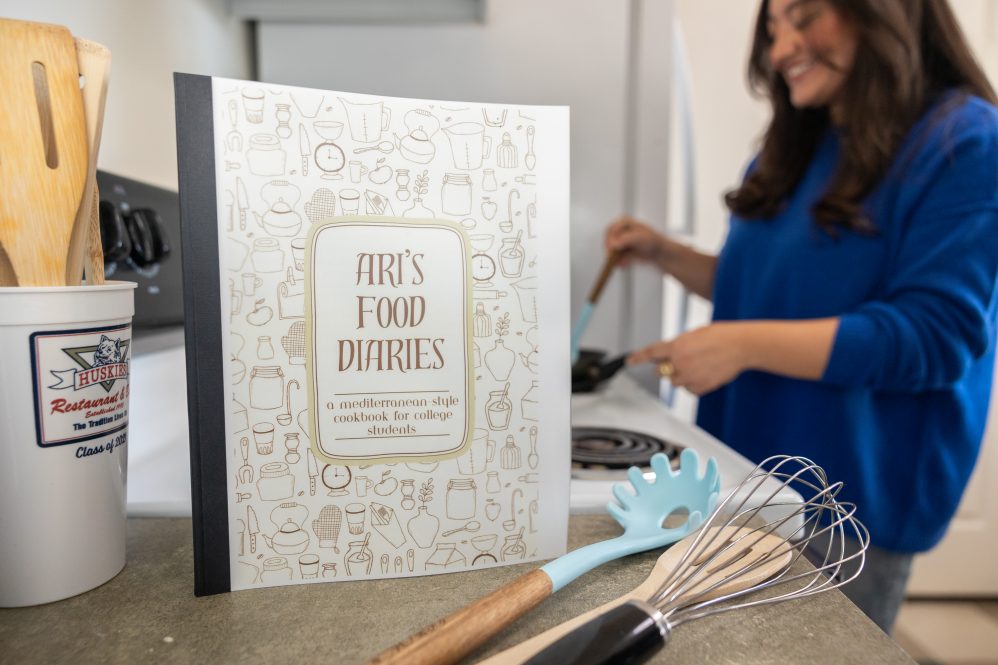When Arianna Meléndez Cintrón ’24 (CAHNR) goes to her favorite dining hall on the Storrs campus – Whitney – she might make a vanilla yogurt bowl with a little bit of peanut butter and some granola, then top it with sliced banana and a drizzle of honey.
At McMahon for lunch, she’ll head for the international station – but skips the pizza, because on the other side, they’re serving salmon and rice.
“I always recommend taking a lap first,” she says. “Try to scope it all out. Sometimes, though, college students – we just don’t have the time for that. We have 20 minutes to grab a meal before our next classes, and some people have that back-to-back.”

She likes the Mongolian beef at Towers, the tacos at Buckley, and the wrap station at North.
“I always tell myself, if all else fails, if I don’t see anything that I really vibe with, I’m making a sandwich,” she says, “and you can create your own. I love that they have that there for students.”
And when she feels like having some dumplings, she does. And sometimes she adds a salad on the side.
“I don’t want it to feel restrictive, because that’s a huge thing in nutrition,” she explains. “It’s much more about mindfulness.”
Food has always been an important part of Meléndez Cintrón’s life – she’s been captivated by the kitchen since she was young, learning how to cook from the women in her family. Food, and especially eating together, is a huge part of her Puerto Rican culture, she says.
“My grandmothers on both sides, and even my aunts, they love to cook, and they have that talent of just bringing people together with good food – growing up in Puerto Rico, there was a never a moment when we didn’t eat as a family,” she says. “I think it’s kind of in my blood, that I just like to cook.”
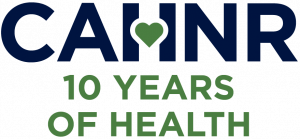
But it’s only been since starting college at UConn that her love of food has evolved into a passion for healthy and mindful eating, and she’s hoping that she’ll help inspire other students to make healthy eating choices during her time at UConn through a project supported by the BOLD Women’s Leadership Network.
‘Really Rough’
Like many students who graduated from high school in 2020, at the height of the pandemic, and transitioned abruptly and unwantedly into online schooling, Meléndez Cintrón had her active life suddenly put on pause, and she missed out on a lot of the coming-of-age experiences that typify the end of high school, like her senior year playing sports, her prom, and a graduation where everyone didn’t have to stay six feet apart.
When the fall came around, she found herself feeling isolated at home in Puerto Rico during her first semester as a UConn student.
“My family definitely kept me grounded and helped me stay motivated and look on the brighter side of things,” she says. “But I felt so stressed. There was a lot of binge eating and just feeling like I lived a very sedentary lifestyle. And I hated that.
“My first semester was really rough.”
She’d been thinking about pursuing a career in health care, but even though she loved studying science, she didn’t see medical school in her future. She originally entered UConn in the School of Business as a health care management major, but business classes left Meléndez Cintrón feeling unfulfilled.
A women and gender studies course was the highlight for her in that first semester.
“I absolutely loved writing and learning about the history of women’s rights and about how women had faced so many struggles in a patriarchal society, how they had their own experiences, whether in the U.S. or in other countries,” she says. “Just seeing how feminism transcends globally, all this stuff – I think that was my favorite class.”
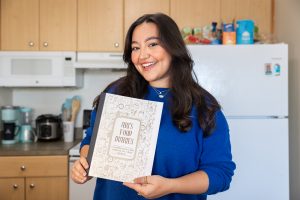
Searching for greater academic validation, she talked to her academic advisor about taking more STEM classes, and in her second semester, she took both a chemistry and a statistics course.
“I loved chemistry, and all I could think was ‘Whoa, this was weird,’” she laughs. “I had such a good time my second semester.”
As her feelings about her college experience started turning a corner, she began exploring different options at UConn and took a course offered by The Major Experience called Making Major Decisions that helped her to hone in on the qualities she wanted for her future career and to identify her own personal strengths and weaknesses.
The experience helped lead her to Allied Health Sciences.
“I saw that I could start there and then choose a concentration,” she says. “There’s a plethora of careers that can go into allied health science. It’s anti fitting into a box, and that was my favorite thing, because I don’t want to be put in a box.”
A BOLD Opportunity
At the end of her sophomore year, while living on campus in Storrs as a part of the Public Health House Learning Community, Meléndez Cintrón applied to BOLD.
“Being surrounded by people who were also interested in working in healthcare drew me closer and motivated me to continue that journey of self-exploration and search for opportunity,” she says.
UConn’s BOLD program focuses on facilitating opportunities for women’s leadership on campus through funding, programming, and engagement in service projects. Once accepted into BOLD through a competitive application process, scholars in BOLD cohorts are given funding and support to initiate their own individual student-led projects. They find a mentor and work to refine and execute their project, which is largely implemented during the summer between their junior and senior years.
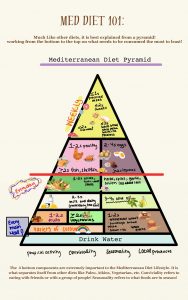
Though she says she applied to BOLD on a whim, the program reminded Meléndez Cintrón of something similar she did while still in high school. For that project, she traveled to beaches all around Puerto Rico and took photographs, which she then displayed and sold to raise money for beach restoration efforts after the devastation caused to the island by Hurricane Maria in 2017.
“I think Puerto Rico is not only a beautiful place, but it’s a healing place,” she says. “I wanted to showcase that environment to still give people hope that, even amidst destruction, we can always lift each other back up.”
With BOLD, she knew that she wanted to focus on nutrition, and once accepted into the program, she started searching ways that she could marry her interest in promoting healthy eating with another – studying abroad.
“My grandma – she is someone who looks 10 years younger than her age, and she’s always lived such a good, healthy lifestyle,” Meléndez Cintrón says. “I remember asking her, ‘Abuela, how do you look so good all the time? How do you fuel your body?’ And she said, ‘Well, I follow a Mediterranean lifestyle.’ And that stuck with me.
“I started looking at study abroad programs for fun at UConn, there was one that was researching the Mediterranean diet and Tuscan cuisine in Florence, and I thought that sounded perfect! It’s meant to be.”
Meléndez Cintrón lived in an apartment in Florence for six weeks while studying with her classmates. Each week, they were expected to pick a key component of the Mediterranean diet – fruits and vegetables, legumes, grains and pasta, and fish – to focus on. They’d then prepare a recipe based on that target ingredient.
“One week, I was focused on fruits,” she explains. “You have to make a recipe that the majority of that recipe will be targeting your fruit intake. For that week, I kind of wanted to make a jam. So, I researched it. OK. How do I make a jam?”
She chose to use peaches for her jam, which were in season in August. That’s another important component of the Mediterranean lifestyle, she notes – using local products and focusing on seasonality.
The diet also focuses on staying hydrated, getting enough physical activity, and sharing meals with other people.
Meléndez Cintrón took two classes while in Florence, as well as additional cooking classes – each week making new recipes that fit into the Mediterranean diet.
Her entire experience there – her research, her friends, the environment, eating together, walking everywhere, discovering food components – fueled her final BOLD project.
“Everything that I researched in that program was the backbone for my cookbook,” she says. “I couldn’t have that cookbook without it. It was instrumental to it.”
‘Something I Wish I Had’
The cookbook that Meléndez Cintrón created for her BOLD project is titled Ari’s Food Diaries, after her Instagram of the same name where she shares photos and recipes of her Mediterranean-style creations. She published both a print and an eBook version, which can be downloaded from her Instagram bio.
Inside her cookbook, there’s the recipe for the peach jam she made in Italy – “It literally takes three ingredients,” she says – as well as summer bowls, fish dishes, pastas, and a chickpea salad.
“This salad is so good,” she says. “And one thing that my grandma did that I really like that I don’t hear much is she uses lemon instead of white vinegar. The lemon is not only tart, but it’s refreshing, and it’s a really good pair with the cilantro and the onions. And then with the components of the beans and the tomatoes and your avocado – I could eat this all in one sitting, by myself.”
Each of the 19 different offerings in her cookbook was tested in her kitchen at the Hilltop Apartments, because while anyone of any age or skill can try them out and enjoy them, the real target audience for Meléndez Cintrón’s recipes is fellow UConn students – who often live in apartments or dorms with bare-bones kitchens and limited access to grocery stores.
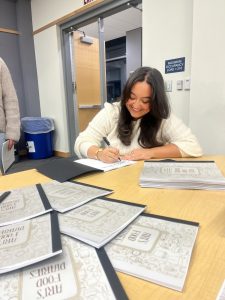
The back of the cookbook is dedicated to what she calls a “survival guide,” where she details Mediterranean-style plates she’s put together at each of the dining halls on the Storrs campus. There, she shares her Whitney breakfast bowl, a balanced dinner at Putnam, and how to pack veggies on a plate at Northwest.
The entire book is stocked with full-color photographs, handwritten notes, easy instructions, and tips for keeping certain staples in a college kitchen.
“I feel as though students can really benefit from this,” she says. “It’s something I wish I had before coming to UConn, as sort of a guide, if students want to start learning more about their health and want to make that a priority. “
After she graduates this spring, Meléndez Cintrón will be pursuing graduate school at UConn Health to finish her accelerated master’s in the public health program. She wants to become a registered dietitian and is interested in working with children – she might focus on pediatrics, or launch her own private practice, or open a restaurant, or even become a food influencer.
“I don’t know, I have so many ideas,” she says. “I think, honestly, for my career, I would love to keep honing in on the sciences, but I want to bring a creative aspect to it. So, maybe some STEM in the arts intersection of some sort, making recipes for a food magazine and then helping out with editing, that would be a dream for me. Or having my own business where we can do stuff like this, that would be really cool.”
Should we be at all surprised if we see Ari’s Food Diaries on the Food Network someday?
“Oh my gosh, stop,” she laughs. “People have told me that. And my mom – I love my mom, because she’s told me, ‘We’re going to take you on a book tour and we’re going to go to all the colleges.’
“I’m like, Mom – who knows what could happen. But maybe I can graduate first!”
Follow UConn senior Arianna Meléndez Cintrón as she cooks Mediterranean-style in Hilltop – and builds dining hall meals around Storrs – on Instagram @arisfooddiaries.
